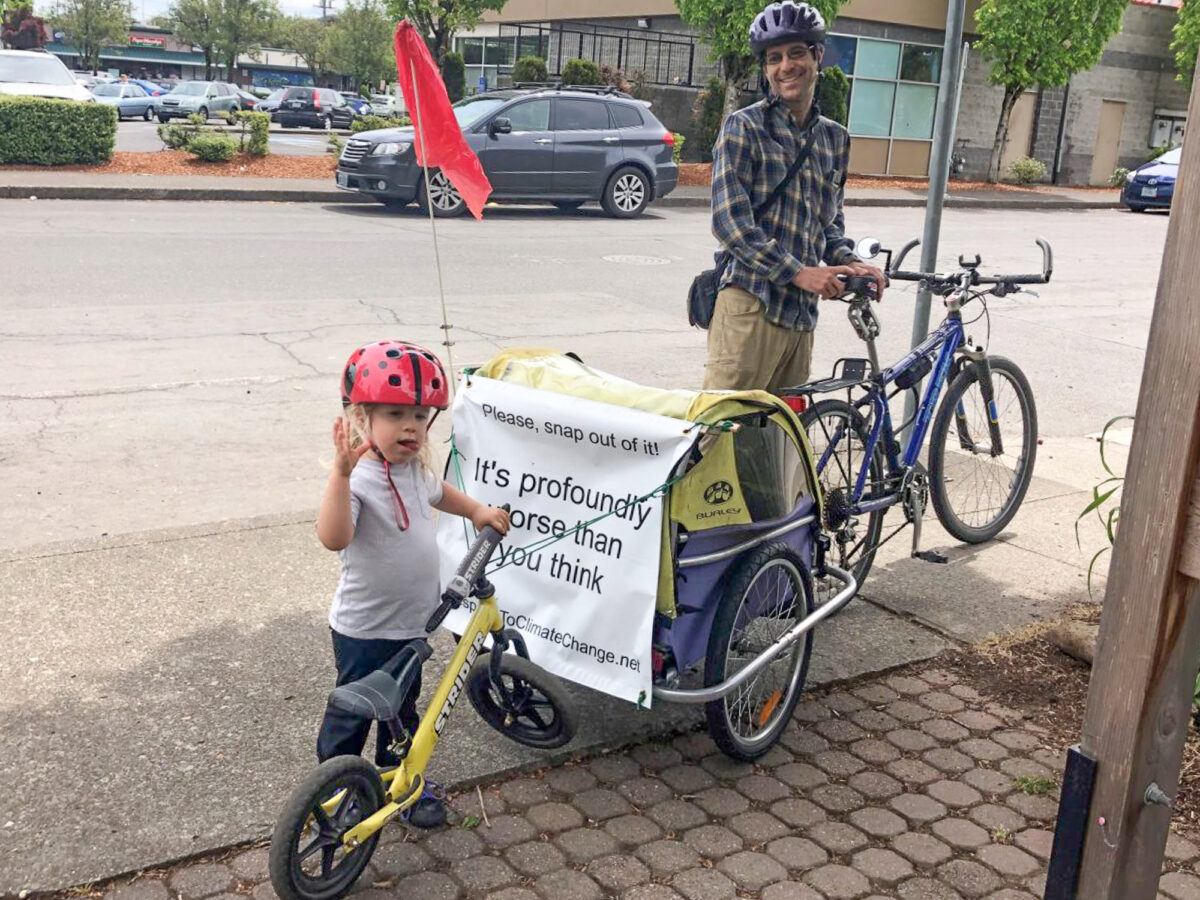
(Photos: Madi Carlson)
This week we’re happy to share a profile of reader Skip Spitzer.
I met Skip on my Bike to School Day bike ride to the ‘Red for Ed’ rally, though I’d noticed his trailer in photos of various bike events around town before. As luck would have it, he was at the Woodstock Elementary play structure a couple weeks later while I was running a bike rodeo and he was nice enough to stick around for a conversation and a few photos…
➤ Tell me a little about yourself and your family.
I’m a single dad of a super groovy 3.5-year-old son. I’ve been car-free since 2013 and have been hauling him in a Burley D’Lite two-seat trailer since he was a baby. He rides a glider bike, which I tow from the back of the trailer when he’s done riding. He’s about to get a pedal bike!
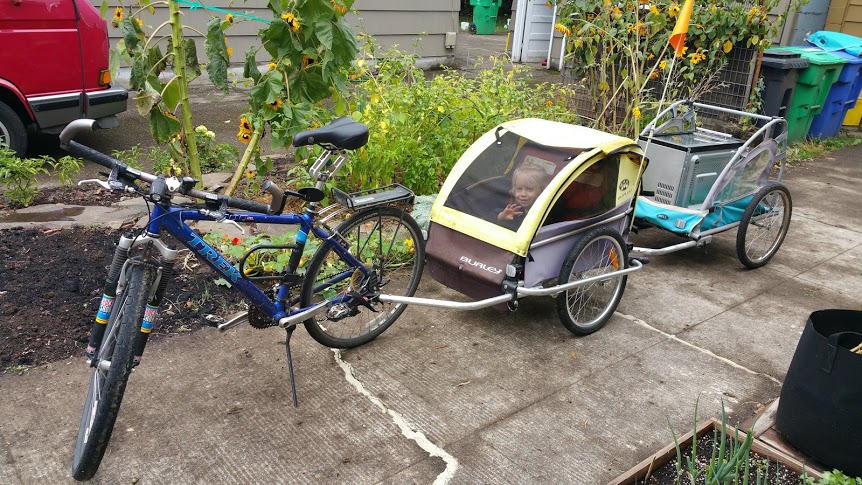
(Photo: Skip Spitzer)
➤ Tell me about your bike.
I’ve been riding a Trek 8000 hardtail mountain bike for about 20 years. It became a town bike when it grew up, so it has Schwalbe “Flatless” tires, an extremely loud AirZound bike horn, a Mirrycle mirror, a Thudbuster seat post, Fortified Bicycle antitheft lights, and the virtually always-on Burley (which also has Schwalbe Flatless tires). These mods and accessories have really been great. The bike is ready for a drivetrain overhaul, but it’s still a great ride even with worn sprockets. I added a hitch to the back of the Burley so I can add a second trailer when needed.
My son is getting a Woom 2. Pricey, but with great resale value, so it should come out to about $50/year for him to begin pedaling on a well-designed and light-weight bike.
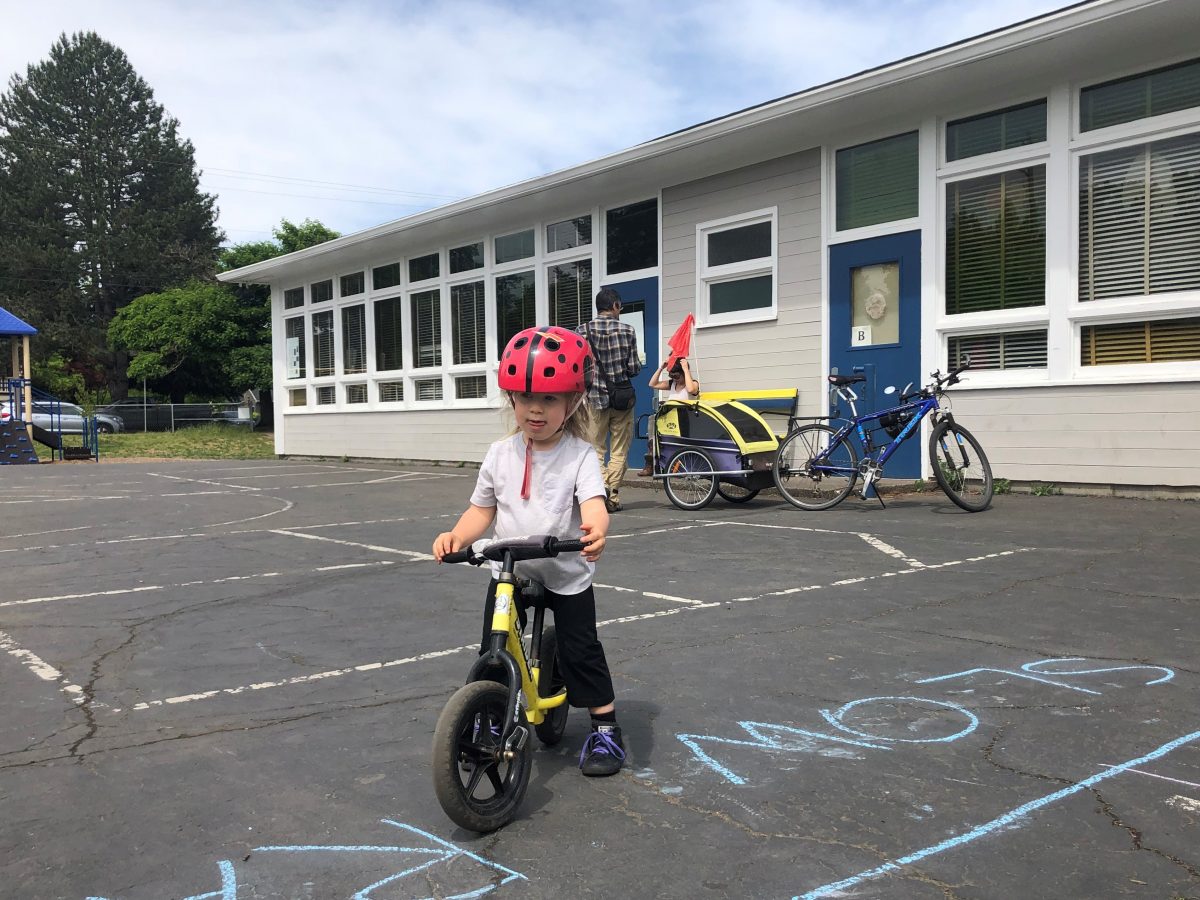
➤ Is there something you wish you had known before you took your first pedal stroke that would have made things easier?
A really useful thing I learned is that, it seems for at least most people, when you don’t have a car, you get good at going by bike, and used to the physical effort and exposure to the elements. Not only does getting up for going by bike become a non-issue, you miss it when there’s a day without a ride: Being out in the world, listening to audio content (or whatever you do with your bonus free time when riding), the way it slows the day down, moving your body, and the way it makes you feel.
I’d also say it’s a good idea to get serious about having ease-supporting gear and systems, like an excellent flat/repair kit (easy to fix flats) and the Schwalbes (not a single flat since getting them), things like a combination lock so you’re not messing with your keys, having both a down and wool blanket in the trailer (one is super warm and the other insulates even if it gets wet), and having a really functional designated place at home for drying them (and wet jackets and rain pants) when needed. Spend some of the money you’re saving on other kinds of transportation and dial things in.
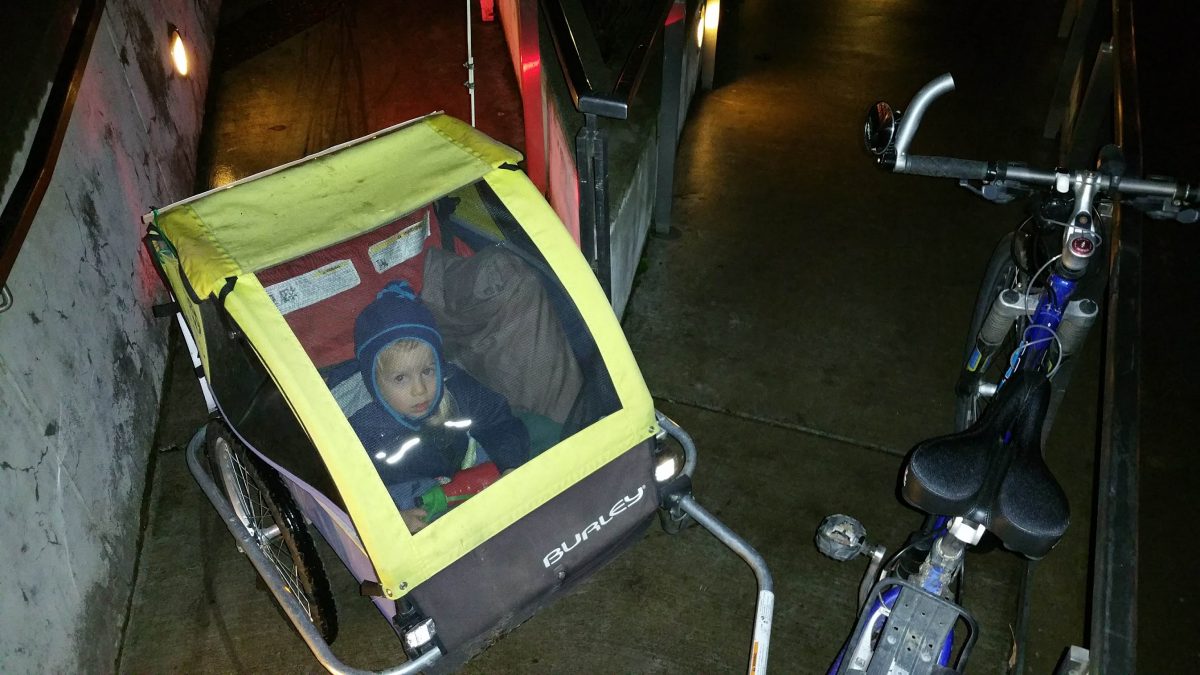
(Photo: Skip Spitzer)
➤ Tell me about an especially memorable ride in Portland.
One day (before the Schwalbes) we got a flat in the pouring rain. We found a great dry spot and, being prepared (including having some buffer time), it was actually easy and fun.
My son’s most memorable ride seems to be the time when Google routed us down a right-of-way through an apartment complex and the trailer couldn’t make a sharp turn in the pathway. He still talks about that one!
Advertisement
➤ Have you biked in other cities and how did it compare?
Yes. Portland is a very cycling-friendly city.
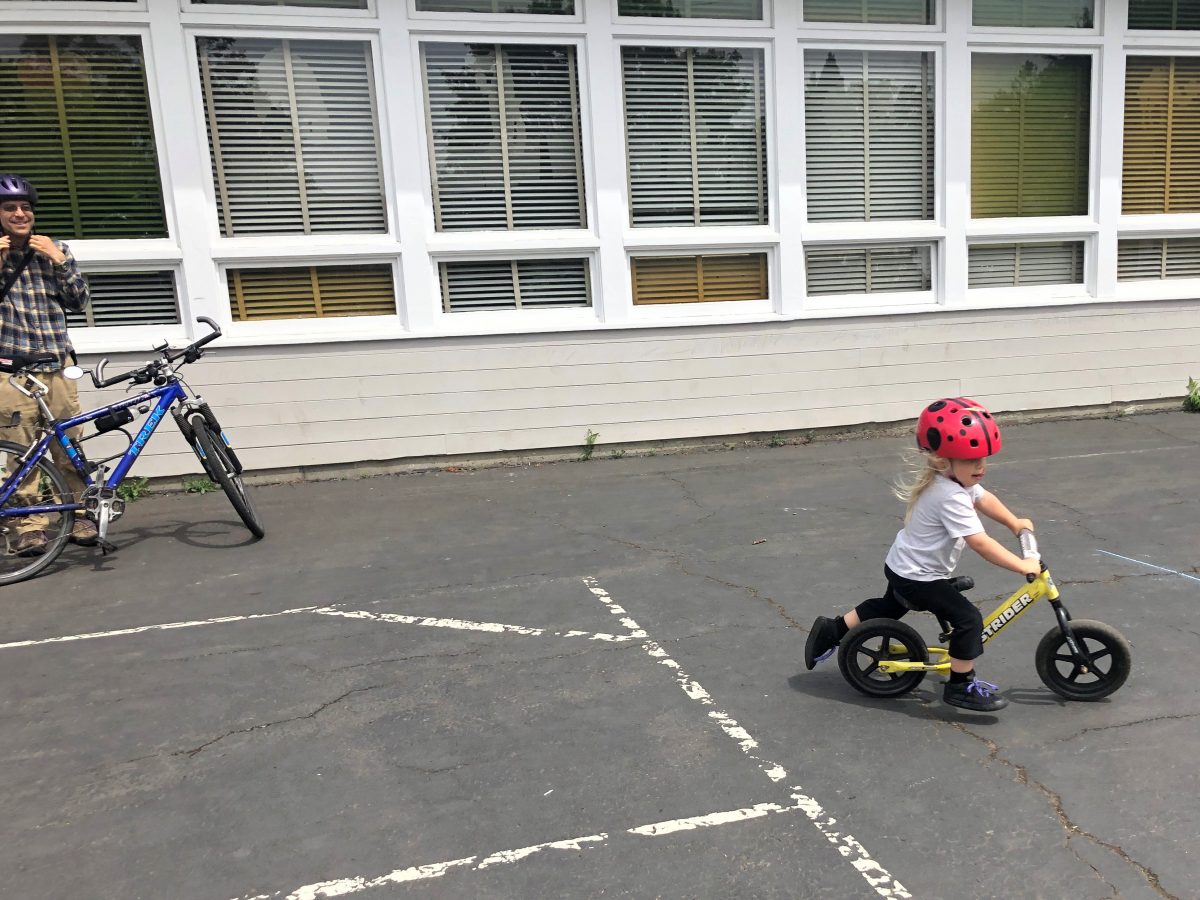
➤ What about rain/snow/wind/extreme heat? Do you bike in less-than-ideal conditions?
Honestly, rain feels like a non-issue. I bike in whatever heat we have and deal with the impacts (like probably won’t be having a hard cider or other dehydrating beverage in the evening). I bike in snow, but I leave plenty of time, never put my kid at risk, and don’t necessarily count on getting to my destination.
➤ What’s your best piece of advice to pass along to BikePortland readers?
Upping your reliance on cycling for transportation is a key way to disconnect from the institutions and practices that are quickly ushering in extremely dark times for us, our kids, and all future generations, as well as save money, de-stress, and support great health.
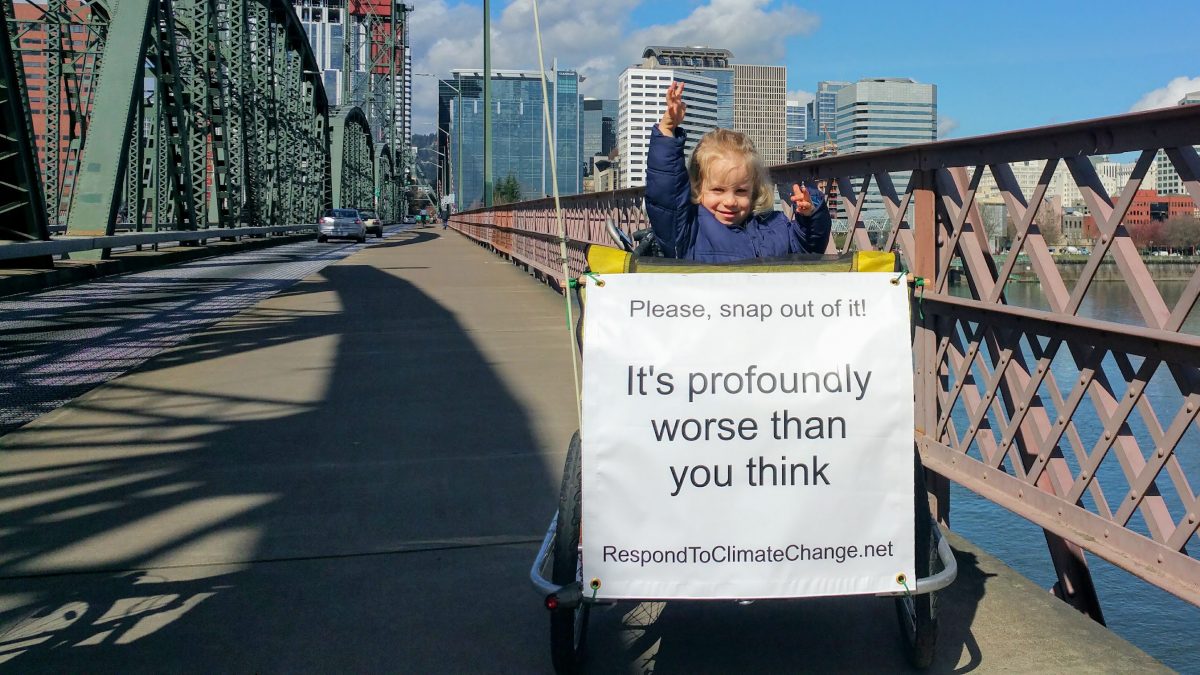
(Photo: Skip Spitzer)
➤ Do you have a social media presence you’d like to share?
Cycling is great, but it’s really just one part of what we need to do to respond the climate and environmental crisis now underway and deepening at alarming speed. At respondtoclimatechange.net you can get a brief, clear, comprehensive, sugar-free, up to date, and science-based overview of the crisis—and ways to respond. It includes an open letter to parents about protecting your children from climate change.
If you pull a trailer and want to help spread a positive message, see my post about how to raise consciousness with a bike trailer billboard.
If you have a 3-5 year old and are interested in cycling-related playdates, feel free to reach out to me through my website: www.skipspitzer.com.
Thank you for sharing your story Skip! And thanks to you all for reading.
Remember, we’re always looking for people to profile. Get in touch if it sounds like fun to you. I’d especially like to feature families of color so please get in touch or ask friends of color who bike with their kids if they’re interested in sharing their stories. And as always, feel free ask questions in the comments below or email me your story ideas and insights at madidotcom [at] gmail [dot] com.
— Madi Carlson, @familyride on Instagram and Twitter
Browse past Family Biking posts here.
Never miss a story. Sign-up for the daily BP Headlines email.
BikePortland needs your support.




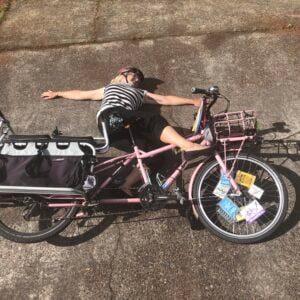
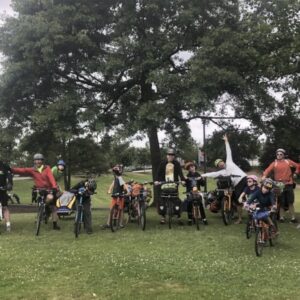
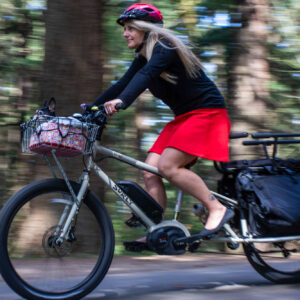
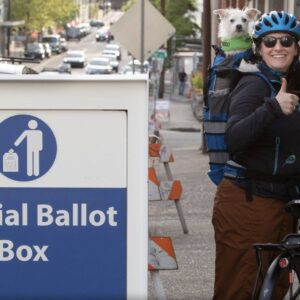
Thanks for reading.
BikePortland has served this community with independent community journalism since 2005. We rely on subscriptions from readers like you to survive. Your financial support is vital in keeping this valuable resource alive and well.
Please subscribe today to strengthen and expand our work.
Love! The world needs more folks like Skip who are fully committed to living their values. Thanks for doing your part and spreading the word on your mobile billboard!
Great Profile of a Great Cyclist. We all join Skip or we kiss it goodbye.
Beautiful! I’d take profiles like this all day, every day. So inspiring.
It is worse than you think 😉
And (some of) the solutions could be more fun than you think, too.
It’s too bad that this person’s efforts (and that of others) are being offset by people with the mindset that we’re screwed anyway, so might as well do whatever we want now. Far worse than ignorance is knowledge ignored by selfish people.
“we’re screwed anyway”
I’m sorry you appear to be attributing that stance to me. I see this as a dynamic situation. The sooner we wake up, stop pretending, take the challenges seriously, set hard targets, take actions, the better chance we’ll individually but more importantly collectively have of avoiding the worst.
Nobody was attributing that to you, but you.
your comment is nested under mine, and I said ‘appeared.’
thanks for clarifying.
It certainly *is* too bad that some people have the mindset that “were screwed anyway” but dont let it get you down. Skip himself addresses your concern on his website respondtoclimatechange.net:
“It’s easy to sidestep changing the way we live by believing that a single person’s lifestyle choices are inconsequential or amount to self-interested “virtue signaling.” In fact, making the most substantive lifestyle changes can help: 1) Lower personal emissions considerably, building toward critical mass of similar reductions; 2) Support development of new standards and modes of living that will be required in a sustainable world (should we create one); 3) Resist the habits and rules of consumption that the system prescribes and depends on (what Czech playwright Václav Havel calls “living within the truth”[79]); 4) Create effective entry points into participating in the climate movement; 5) Overcome cognitive dissonance, hopelessness, and other psychological barriers to taking action;[80] 6) Alert and move others; and 7) Break the “spiral of silence” (in which even people who care about climate change shy away from talking about it because they rarely hear others doing so).[81]”
It’s also important to remember that some of your personal choices can have a HUGE impact. For example: your family size or the choice to adopt vs create children have a dramatic impact on future carbon emissions.
The whole “screwed anyway” thing doesn’t really stand up to scrutiny does it? It’s always an excuse to do something negative. You never hear someone say “Welp, we’re screwed anyway, so I guess I might as well devote my life to some demanding and thankless humanitarian cause.” How you behave when you’re “screwed anyway” says a lot about you. And we’re all, always screwed anyway – nobody gets out alive!
I agree with your view on fun solutions. I look forward to the day when me and my crew travel the streets in our giant steam punk car crusher. It will be powered with the petro-fluids squeezed out of the compacted oil-buggies. The crowds will cheer the removal of the abandoned rusting hulks that have blighted their neighborhoods. The future can be fun.
The kinds of leaders Americans choose for themselves do not give one much hope that anything will change for the better. Plus, those four asteroids supposedly on a collision course with Earth about mid-century has me puzzled as to why people are so obsessed with accumulating wealth.
Have you told NASA?!
>those four asteroids supposedly on a collision course with Earth about mid-century…
I’m afraid you are misinformed.
Don’t underestimate Skip’s even more important choice to limit his reproduction to only one child. Zero would be better but if you are going to have any the most important thing you can do for the planet really is to stop at one.
The birth rate is already plummeting. Young people are no longer chasing “the American dream,” getting married, having kids, buying homes, etc. Unfortunately, too little, to late.
@Mike I think “plummeting” is a bit of an overstatement. US fertility rate in 1983 was 1.80 children per woman, in 2016 the US fertility rate was 1.80 per woman.
Comment of the week.
And with the caveat, that it is actually a bit more complicated than that.
https://www.pewresearch.org/fact-tank/2019/05/22/u-s-fertility-rate-explained/
Interesting article. It begins with the sentence “For the fourth year running, a key U.S. fertility rate has reached a record low”, and then goes on to say “but it’s complicated.”
The truth is developed societies need to cut energy use 90% to mitigate climate change. There is no stopting it because we have passed the tipping point. But we can slow it. 90% energy use drop also applies to consumption. That is why I opened a repair shop.
Neat bike things happen in Woodstock Park–also School!
Love this guy and great story! But would he be as comfortable out here in east PDX riding streets like 122nd?
Portland is still building infrastructure that Skip’s bike and trailer couldn’t fit through.